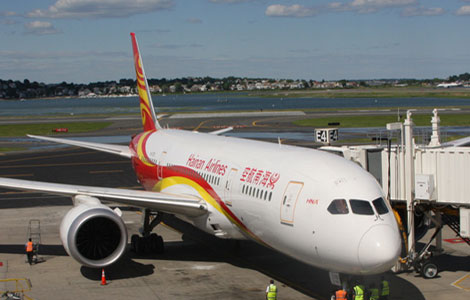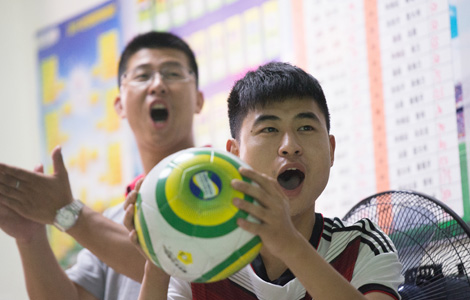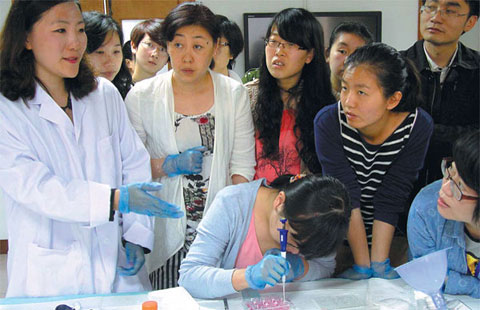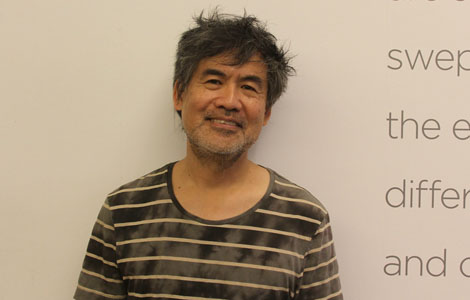'Reform needed' for vocational education
Updated: 2014-06-24 07:18
By Zhao Yinan and Luo Wangshu (China Daily)
|
||||||||
Premier says private investors, social enterprises can play important role
Skills-based vocational education is receiving unprecedented attention from the central government as China seeks to ensure high employment and improve the image of perceived "cheap" made-in-China products.
Premier Li Keqiang invited private investors and social enterprises on Monday to play an important role in helping vocational training attain that goal.
Li made the remarks in his address to participants in the national vocational education meeting. The last such vocational-education meeting was eight years ago.
"Reform is needed to promote vocational education, in which the relations between the government and the market should be properly handled," Li said.
"In addition to the government, social entities, companies and private investors should take part in establishing more vocational training of different levels to integrate practical needs with teaching.
"The rise of the Chinese economy is accompanied with quality improvements of Chinese products and services, and such improvements rely on a large number of skilled workers," Li said.
"Imagine the scale and level of Chinese products and services if most of the 900-million-strong labor force can be trained to master medium- and high-level skills."
Pointing to employment as one of his major indexes to judge whether a stimulus measure is needed for the declining Chinese economy, Li is requiring his administration to create another 10 million jobs this year.
In a guideline for the development of vocational education approved by the central government in February, the government called for more attention, investment and policy support to push forward the development of modern vocational education and boost employment.
It also advocated curricula reforms to make sure students are obtaining the necessary skills to "open more career opportunities".
The guideline said the total number of students at vocational education institutions will increase to 38.3 million by 2020.
About 6 million students graduated from more than 1,300 registered higher vocational schools last year, a figure almost on par with the number of university graduates in 2013.
Currently, 29.34 million students study at 13,600 vocational schools and colleges across China. Their average employment rate could reach 90 percent.
Despite the high employment rate, Ge Daokai, head of the vocational education division of the Ministry of Education, said many Chinese parents and students still prefer ordinary college education over vocational schools - often viewed as a secondary option for students with poor academic records.
He said vocational schools are often poorly equipped with limited funds and inadequate faculty.
Liu Qiaoli, a researcher at the National Institute of Education Sciences, said traditional Chinese thought values people's morality more than skills, which makes the country's modern vocational education deficient at the start.
"Now the top leadership, including Premier Li Keqiang, are redefining modern vocational education. He connects it with improving people's livelihoods and the country's development, and he acknowledges the essential role of vocational education," she said.
Liu said most of the vocational schools in China still take the initiative in teaching and in course planning, rather than using the models of foreign countries, such as Germany, that rely on industry-school cooperation.
"In many cases, education-related organizations are the ones that care about improving vocational education. Companies and employers don't have strong motives. It is important for them to recognize the importance of developing vocational education. It means a lot to the companies and the country."
Wang Lu, the general manager of the education and training department of Lenovo Group, based in Beijing, said Lenovo needs talented employees and considers it meaningful to participate in developing vocational education. "New technology and skills grow fast, while Lenovo needs employees who can master the new skills faster than others," he said.
- 38m students expected at vocational schools by 2020
- Vocational students' competition underway
- Alternative gaokao attracting interest in vocational colleges
- Vocational schools cannot solve unemployment issue
- Modern vocational education urged
- Vocational colleges to get new English-language textbooks
- Gaokao reform to boost vocational education talent

 Fosun invests in studio to get Hollywood's know-how
Fosun invests in studio to get Hollywood's know-how
 Beijing, Boston are just 13 hours apart
Beijing, Boston are just 13 hours apart
 UN list adds Silk Road, Grand Canal
UN list adds Silk Road, Grand Canal
 Chinese tourists advised to play it safe
Chinese tourists advised to play it safe
 Top Chinese artists featured on Mall
Top Chinese artists featured on Mall
 Conference targets China, US biopharma ties
Conference targets China, US biopharma ties
 World Cup ignites online match betting
World Cup ignites online match betting
 Giving Chinese soccer a boost
Giving Chinese soccer a boost
Most Viewed
Editor's Picks

|

|

|

|

|

|
Today's Top News
Criticism by ex-US official dismissed
PLA official rips Tokyo's 'historical distortions'
32 terror groups busted in Xinjiang
Chinese paper plant to employ 2,000 by 2020
China hits the Western operatic 'High C'
Neighboring countries urged not to stir tensions
Criticism by ex-US official dismissed
Roughshod over China's rights
US Weekly

|

|







